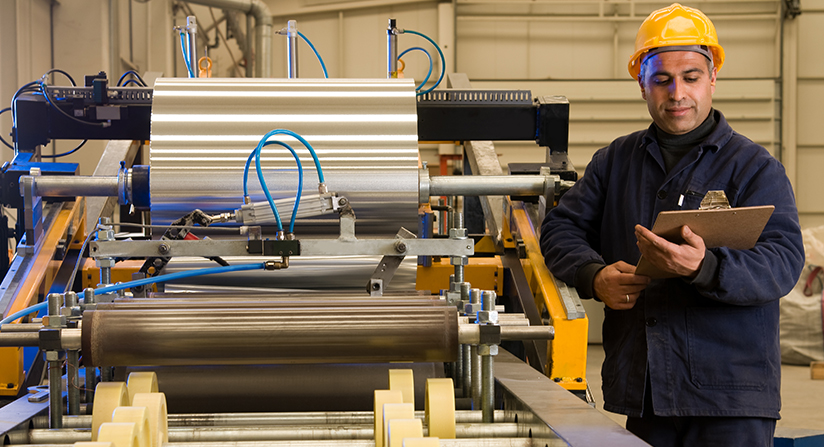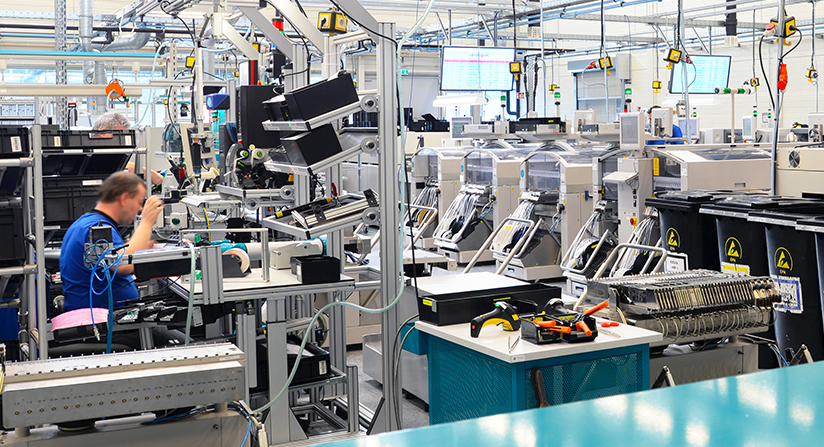The shop floor is the cornerstone of the manufacturing process. It is the place where machines are set up for production, parts are assembled, raw material is processed, and operations are scheduled.
When well managed, the shop floor works at optimal capacity and with operational efficiency. In this blog, you will learn how a Manufacturing Execution System (MES), also known as a Shop Floor Execution System (SFES), embedded in an ERP (Enterprise Resource Planning) system transformed an industrial machinery manufacturer’s shop floor to help grow their business.
1. Better Decision Making with Real-Time Insight
The industrial machinery company wanted to better track materials and production in real-time. They needed their shop floor managers to be able to see what was happening with workers, machines, and output. They also wanted shop floor KPIs to be available to the stakeholders immediately so they can see where production is at any given time. Decision-makers needed to see how many products were stored, produced, and shipped.
When they implemented an MES integrated with a manufacturing ERP, real-time information about what was happening on the plant floor was available across the enterprise. Shop supervisors could see the status of the production line to know when tasks began, ended, and if they were interrupted, what caused the interruption. They now have insight into productivity, and can assess performance by worker, shift, and machine. They also can see how many items are made, how long it took, and if any products were faulty.
With MES, managers can determine where they need to make improvements in the production cycle based on key financial metrics. Fast access to important information about production data, allows management to make better decisions for efficiencies and cost reductions. The information from the shop floor is providing insight into product genealogy, material management, work in progress, traceability, and performance to help them optimize productivity and better understand demand.
2. Greater Demand Forecasting
With the implementation of a manufacturing execution system with ERP, the industrial machinery company now has access to information about demand changes to stay on track with production. They have the flexibility to easily reschedule and re-sequence activities in their work centers. Information such as parts and serial number usage, production levels, scrap material, and more are fed from the MES to the ERP to help them have accurate demand forecasting to reduce inventory and avoid overproduction.
3. Increased Connectivity to Quickly React to Change
With their manufacturing ERP, the industrial machinery company’s shop floor data gets sent to other departments to allow the right person to respond proactively. Operations on the shop floor are coordinated with sales, customer service, purchasing, logistics, and shipping. This fast access to shop floor information allows them to keep the right amount of inventory on hand, lets customer service easily answer questions on the status of an order, gives sales visibility to stock levels, lets purchasing know when to reorder, and helps everyone quickly pivot to meet customer demand.
4. Improved Quality for Enhanced Customer Satisfaction
The information they collect on the production floor helps to determine if a deviation occurred and this data is provided to the quality management system in the ERP. A workstation operator can uncover an abnormality and report it. Any event that triggers a nonconformance is further reviewed by their quality management team. The MES provides important data that is immediately available for reporting and action. It not only helps them collect crucial data, but it also helps different levels of the organization play an important role in quality control.
With their improved quality performance, the industrial machinery organization can achieve greater customer satisfaction. Errors are quickly noted. With their manufacturing execution system, they eliminate the risk of an operator referencing the wrong bill of material (BOM) or missing a work instruction revision. Their MES maintains a history of the entire product lifecycle. It serves an indispensable role and has helped them provide high-quality output and achieve increased customer satisfaction.
5. Increased Control and Revenue
With their MES, the industrial machinery company has seen improvements in productivity as they have increased control over manufacturing operations. They have more information on what is happening on the plant floor to make quick decisions and keep tighter control over processes. As a result, it has lowered their costs, reduced downtime, and reduced waste. They can now quickly report on any problems in production and get them immediately corrected.
As a result of these improvements, the manufacturing execution system has helped to save time and money. Waste has been reduced and productivity has increased. Customers feel confident in their products and this has helped to improve sales. All these factors have made a positive difference in their company’s bottom line.
Transform Your Shop Floor with MES
An MES system integrated with a modern ERP system can help manufacturers with greater productivity, better insight, and lower costs. Its functionality is essential for growing manufacturing businesses to help them stay on top of fast-paced operations, maintain quality, and be ready to meet customer demand.
Here are some of the functionalities MES provides to help manufacturers grow and prosper:
- Manage labor, machines, and materials for optimal shop floor performance
- Assign workers with a specific skill set to the best machine without having to go to the shop floor
- Attach all types of instruction formats to work orders to make it easy for workers to understand the tasks
- Monitor what is happening on the shop floor in real-time from anywhere
- Split tasks and assign them to different people to ensure they get completed on time
- Machine operators can report job status from their workstation
- Product genealogy can be accessed at any time in the production cycle
- Detect any product inconsistencies and capture labor, tooling, scrap, downtime, and other expenses
- Increase production speed and efficiency for greater productivity
- Minimize excess inventory to reduce carrying costs and needed storage space
- Trace lot numbers, from raw materials to work-in-progress items, with finished goods for improved quality compliance
- Decrease downtime with integrated scheduling and maintenance
Conclusion
The shop floor is the heart of your manufacturing business. It’s important to invest in the technology that will help your growing manufacturing business work efficiently. MES integrated with ERP software will complement each other and help your organization better compete, reduce costs, enhance productivity, improve efficiency, and increase revenue.
Contact our experts to learn more about transforming your shop floor with MES.
FAQs:
What is a shop floor in manufacturing?
The shop floor in a manufacturing business refers to an area where the production function is executed. It is the place where people work on machines, pre-production, production, post-production, and distribution processes. The shop floor is an essential part of a manufacturing business and must be run effectively for the business to grow and prosper.
What are the benefits of shop floor management?
A manufacturing execution system or a shop floor execution system tracks, evaluates, prioritizes, and reports on production orders and schedules to help manufacturers improve profits. When your ERP software is embedded with shop floor control functionality, managers can easily assign shop floor tasks, catch defects, create non-conformance reports, see the actual time taken to complete a job, and attach job instructions in a variety of formats.
How does a manufacturing execution system or a shop floor execution system improve production efficiency?
Every manufacturer wants to increase shop floor efficiency for better profit margins and continued success. Productivity on the shop floor depends on efficiency, effective management, and good working equipment. Manufacturing process improvements lead to better efficiency.
Production efficiency can be improved by proactively managing machine failures, strengthening supply chain processes, investing in employee training, standardizing even the simplest tasks, and focusing on recycling scraps and factory returns.
Follow Us





